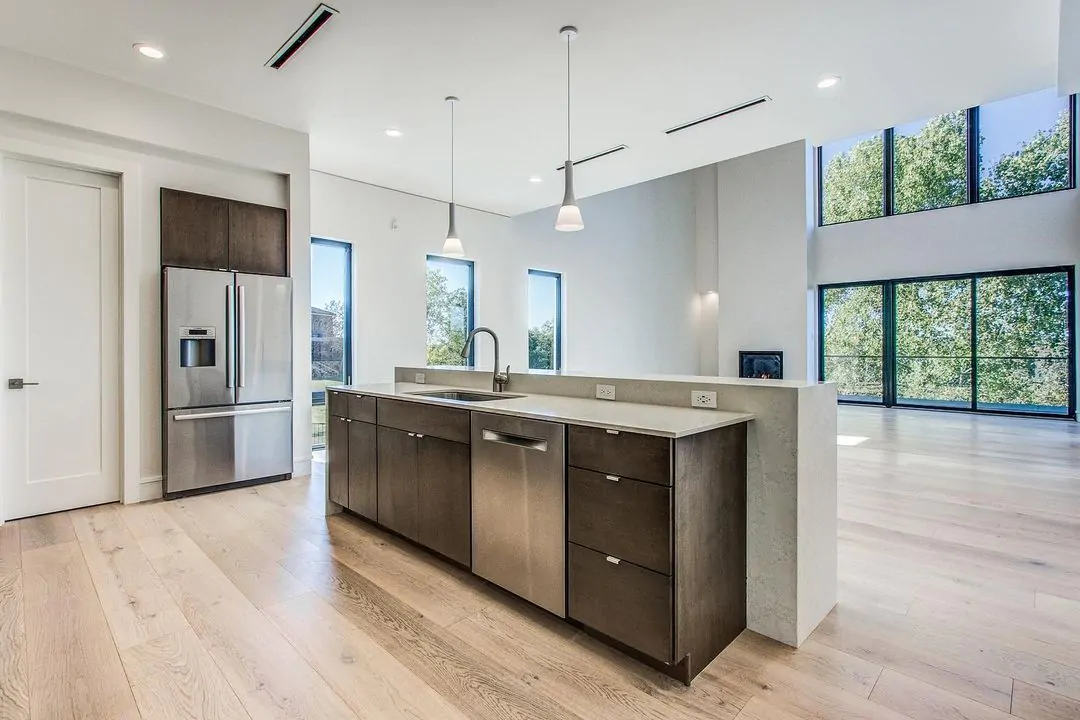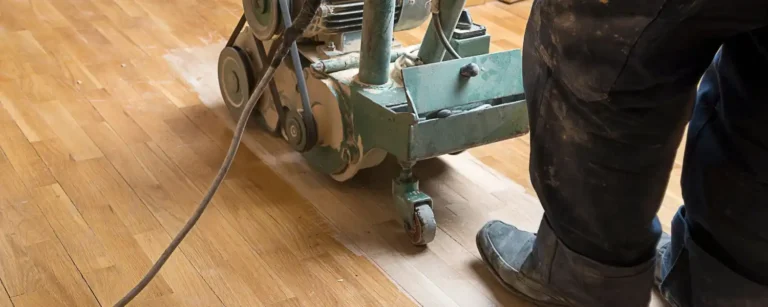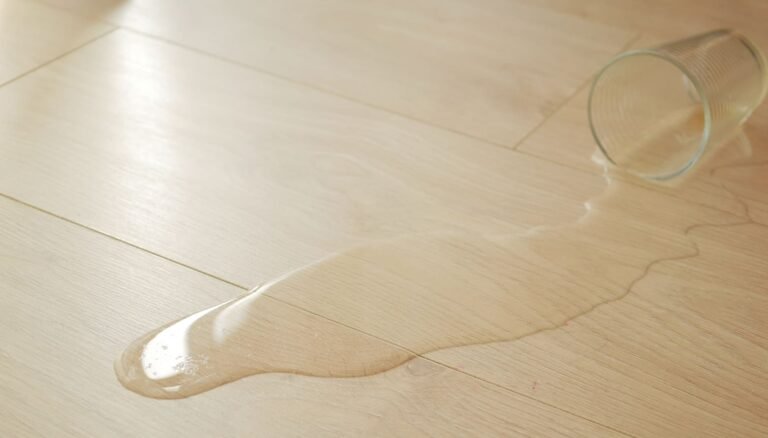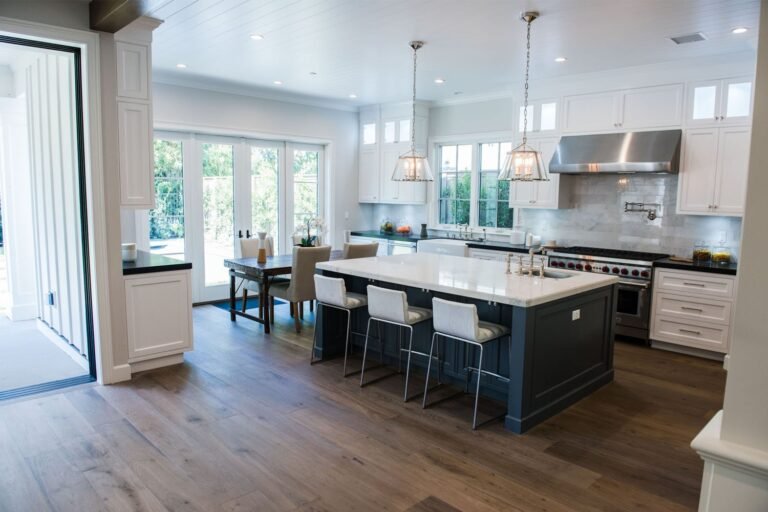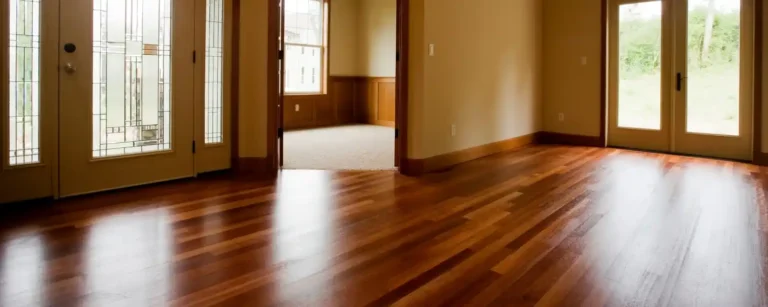Which is Better? Tile vs Engineered Hardwood
When choosing the perfect hardwood flooring for your kitchen, living room, bathroom or other residential dwelling space, you may need clarification on the tradeoffs between tile and engineered hardwood. Both options have unique advantages and considerations, challenging the decision-making process. This comprehensive guide on tile vs engineered hardwood will compare these two flooring options and help you choose the most suitable option.
Understanding Engineered Hardwood
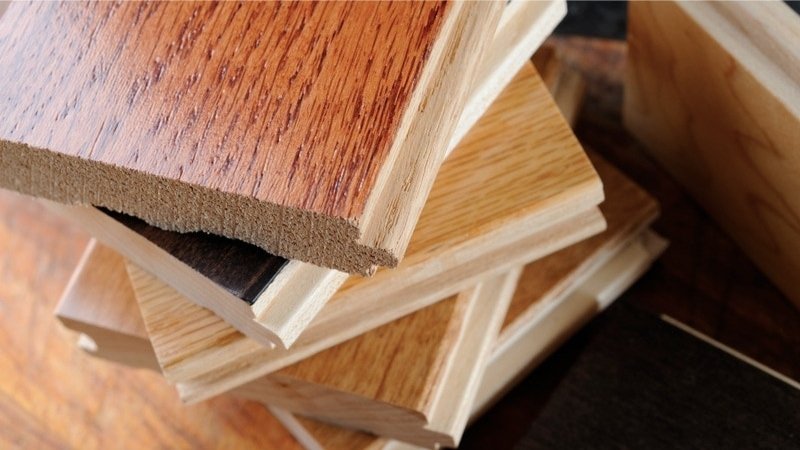
What is Engineered Hardwood?
Engineered hardwood flooring offers the timeless beauty of traditional hardwood while incorporating contemporary construction techniques. Its designs provide the aesthetic appeal and durability of solid hardwood flooring but with added stability and versatility.
Explore the Details of Engineered Hardwood Flooring in our extensive post, “What is Engineered Hardwood Flooring?“
Composition of Engineered Hardwood
Engineered hardwood typically comprises three to seven layers of wood veneers bonded with adhesive under high pressure and heat. The top, or wear layer, consists of solid hardwood, imparting an authentic look of real wood. Beneath the wear layer, multiple core layers made of plywood or high-density fiberboard (HDF) enhance the flooring’s stability and strength. The bottom, or the backing layer, serves as a highly durable stabilizing base for the entire plank.
Advantages of engineered hardwood
Durability
Engineered hardwood is renowned for its excellent durability. The cross-grain construction and multiple layers of wood make it resistant to expansion contraction and warping caused by moisture and temperature changes.
Versatility
An advantageous benefit of engineered hardwood is its versatility. It comes in dozens of styles from rustic to traditional to contemporary to post-modern and can thus match any desired commercial or residential decor. It can be installed in various locations, including the basement, using different methods such as glue-down, nail-down, or floating.
Cost-effectiveness
Compared to other hardwood flooring options, engineered hardwood is a cost-effective solution that maintains quality and aesthetics. Its manufacturing process allows for efficient utilization of wood resources, making it both affordable and eco-friendly.
Understanding Tile Flooring
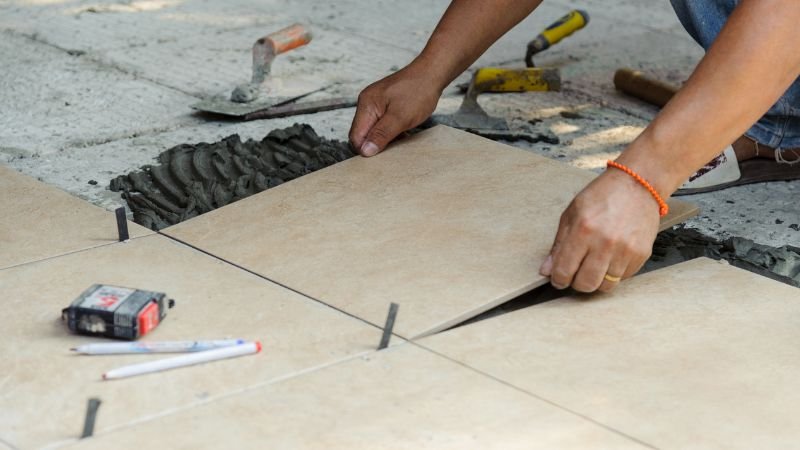
What is Tile Flooring?
Tile flooring consists of tiles made from various materials, such as ceramic, porcelain, natural stone or glass. These tiles typically have a square or rectangular shape and are available in various sizes, colors, patterns and finishes.
Composition of Tile Flooring
The following components make up tile flooring:
Tile Body: This constitutes the main body of the tile and comprises ceramic, porcelain, natural stone or glass. It provides the tile’s structural integrity and contributes to its overall durability.
Glaze or Finish: A protective layer is applied to the tile’s surface, enhancing its appearance, durability, and resistance to stains, scratches and moisture. Depending on the desired aesthetic and functional requirement, the glaze can be glossy, matte or textured.
Advantages of tile flooring
Durability
Tile flooring is highly durable and resistant to wear and tear, making it suitable for high-traffic residential and commercial areas. Ceramic, porcelain and natural stone tiles are known for longevity, providing long-lasting performance even in areas susceptible to heavy usage and impact.
Moisture Resistance
Tile flooring is moisture-resistant, making it an ideal choice for areas prone to spills, moisture or humidity such as bathrooms, kitchens and laundry rooms.
Versatility in Design Options
A notable advantage of tile flooring is its versatility in design options. With a wide range of materials, colors, patterns and sizes, individuals can customize tile flooring to suit various design preferences and aesthetic sensibilities.
Tile vs Engineered Hardwood
| Aspect | Engineered Hardwood | Tile |
| Appearance | Warm, natural wood look | Wide variety of colors, patterns and texture |
| Cost | $6 to $12 per square foot | $5 to $15 per square foot |
| Suitable Areas | Recommended for dry areas but can also be used in basement | Suitable for all areas, including bathrooms and kitchens |
| Size | Available in planks | Available in various sizes and shapes |
| Installation | Can be glued, nailed or floated | Requires mortar or adhesive for installation |
| Durability | Water-resistant, susceptible to scratches and dents, may require refinishing over time | Water-proof, resistant to scratches and dents, can chip or crack under heavy impact |
| Warmth Retention | Retains heat, warmer underfoot | Cold surfaces may require radiant heating for warmth |
| Lifespan | Average lifespan of 20-30 years | Average lifespan of 20-30 years |
| Environmental Impact | Sourced from sustainable forests | Various eco-friendly options are available |
| Maintenance | Regular sweeping and occasional refinishing | Regular cleaning with mild detergent, occasional resealing |
| Repairing/Refinishing | Can be sanded and refinished to repair scratches and damages | Damaged tiles need to be replaced, and grout may require resealing |
Appearance
Engineered Hardwood
Engineered hardwood provides a timeless and classic appearance that adds warmth and elegance to any commercial or residential floor space. Its authentic wood grain and natural look give a rich and inviting aesthetic. Engineered hardwood is available in various patterns (e.g. Chevron, Herringbone), wood species (e.g. European Oak, Walnut), finishes and textures, allowing for customized design.
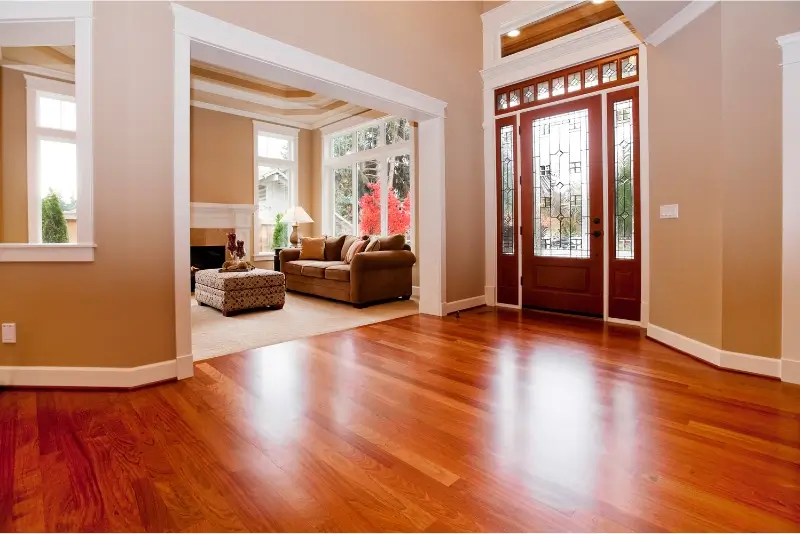
Tile
Tile flooring presents a versatile appearance, ranging from sleek to traditional options. The availability of various materials, endless designs and bright colors allow infinite customization possibilities.
Which is Better? Tile vs engineered hardwood
In terms of appearance, engineered hardwood stands out with its genuine wood grain and rich brown earthy tones. It brings warmth and sophistication to any room, creating a timeless and elegant look. While tile flooring offers versatility, the graceful, distinguished appearance of engineered hardwood makes it the better choice.
Cost
Engineered Hardwood
Engineered hardwood comes at a moderate to high cost, depending on its quality, durability and aesthetic appeal. Although it may have a higher initial investment, its long-term value and durability make engineered hardwood affordable over its lifespan for homeowners seeking a sleek, long-lasting prefinished wood flooring solution.
Learn more about the Pricing of Engineered Hardwood Flooring in our comprehensive article “How much does Engineered Hardwood Flooring Cost?“
Tile
Tile flooring offers a wide range of price points influenced by material, size, design and installation method. Ceramic and porcelain tiles are generally more budget-friendly, while natural stone tiles are costlier.
Which is Better? Tile vs engineered hardwood
While engineered hardwood may require a higher upfront investment, its durability and long-term value outshine other options. Unlike tile flooring, which incurs additional maintenance costs over time, custom engineered hardwood flooring offers a cost-effective solution with minimal maintenance requirements.
Suitable Areas
Engineered Hardwood
Engineered hardwood suits various home areas, including living rooms, bedrooms, dining rooms and even kitchens. Its stability along with scratch-resistant and moisture-resistant qualities make it ideal for spaces where traditional solid hardwood is not advisable.
Tile
Tile flooring is versatile, and you can use it in many areas, including kitchens, bathrooms, entryways and outdoor spaces like decks or patios. Its exceptional moisture resistance and remarkable durability make it ideal for high-traffic and moisture-prone areas.
Which is Better? Tile vs engineered hardwood
Due to its stability and moisture resistance, engineered hardwood is better in indoor spaces such as living rooms, bedrooms, dining rooms and kitchens. Although we can use tile flooring in various settings, its maintenance, which involves managing grout, needs improvement compared to engineered hardwood’s advantages.
Size
Engineered Hardwood
Engineered hardwood planks are available in various sizes, ranging from narrow strips to wider planks. The size options allow flexibility in design and installation to accommodate different preferences and room dimensions. Homeowners can select the planks’ width and length based on the space’s layout and style, ensuring a customized and harmonious appearance.
Tile
Tile flooring is available in various sizes: small, standard square or rectangular, and large-format tiles. The range of size allows homeowners to create unique patterns and designs, whether they prefer traditional grid layouts or more contemporary patterns.
Which is Better? Tile vs engineered hardwood
The flexibility of engineered hardwood with its diverse plank sizes allows customized design in different room layouts, offering versatility and adaptability. While tile flooring also provides a wide range of size options, its fixed dimension may restrict design flexibility, particularly in irregular-shaped rooms.
Installation
Engineered Hardwood
Installing engineered hardwood involves one of three methods: floating, glue-down or nail-down. The floating floor installation involves interlocking the planks over an underlayment. Likewise, the glue-down method requires directly adhering the planks to the subfloor. As for the nail-down method, it requires securing the planks firmly with nails. These methods are simple, and professionals and DIYers can easily accomplish them.
Learn how to install Engineered Hardwood Floors in our detailed guide, “Installing Engineered Hardwood On Concrete.“
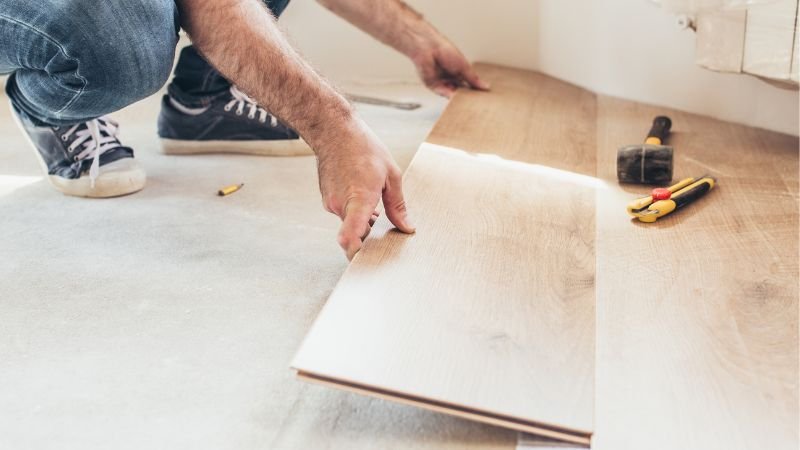
Tile
Tile flooring installation involves the following steps:
- Preparing the surface
- Applying adhesive or mortar
- Laying the tiles in the desired pattern
- Grouting
- Sealing
The complexity of tile installation can vary based on factors such as the type of tile, the condition of the substrate and the desired pattern. We recommend seeking the assistance of professionals for tile flooring installation.
Which is Better? Tile vs engineered hardwood
When considering installation, engineered hardwood offers a simple option suitable for professionals and DIYers. On the other hand, tile flooring requires more complex procedures, such as surface preparation, adhesive application, tile laying, grouting and sealing which professionals best handle.
Durability
Engineered Hardwood
Engineered hardwood is known for its durability and resistance against wear and tear, scratches and dents. Its multiple layers of wood provide stability and strength, reducing the likelihood of warping or cupping due to changes in humidity and temperature.
Tile
Tile flooring is highly durable and capable of withstanding heavy foot traffic, moisture and stains. Ceramic and porcelain tiles are known for their longevity and strength. They resist scratches, dents and fading.
Which is Better? Tile vs engineered hardwood
Engineered hardwood stands out for its ability to endure scratches, dents and warping, even in high-traffic areas. Its multi-layered construction ensures long-lasting usage with minimal maintenance. Similarly, tile flooring is highly resistant to heavy foot traffic, although it may require regular maintenance to preserve its appearance.
Warmth Retention
Engineered Hardwood
Engineered hardwood excels in excellent warmth retention, providing a cozy and comfortable feel. Its natural wood composition is a natural insulator, effectively capturing, holding and preserving heat and in order to sustain a comfortable indoor temperature. Consequently, engineered hardwood remains popular for bedrooms, living rooms and other areas where warmth and comfort are top priority.
Tile
Tile flooring exhibits lower warmth retention than engineered hardwood. Its thermal conductivity is low, resulting in a cooler sensation underfoot and better ambient temperature control. Although it is possible to install radiant heating systems beneath tile flooring to improve warmth retention, this additional feature comes with extra costs and installation complexities.
Which is Better? Tile vs engineered hardwood
When evaluating warmth retention, custom hardwood flooring outperforms tile flooring. The innate insulating properties of its natural wood composition keep your space warm and cozy, even during winter.
Lifespan
Engineered Hardwood
Authentic luxury engineered hardwood is known for its longevity and durability, boasting 20 to 30 years or even more with proper care and maintenance. Its multi-layered construction imbues it with stability and strength, effectively reducing the risk of warping, cupping, splintering, flaking or any other damage over time. Furthermore, homeowners can refinish engineered hardwood multiple times throughout its lifespan, allowing it to restore its appearance and extend its longevity.
Learn more about Engineered Hardwood Flooring’s Longevity in our comprehensive post, “How Long Does Engineered Hardwood Last?“
Tile
Tile flooring also has a long lifespan, often 20 to 30 years, with regular maintenance. It has exceptional resistance to wear and tear, scratches and stains, preserving its appearance and structural integrity over time. However, there is the aforementioned tradeoff of tile taking more effort to clean and maintain.
Which is Better? Tile vs engineered hardwood
Engineered hardwood and tile flooring offer impressive durability, lasting 20 to 30 years with proper care. However, it is possible to refinish engineered hardwood multiple times. This unique feature extends its lifespan, making it a remarkably durable and enduring flooring option.
Environmental impact
Engineered Hardwood
Engineered hardwood is more environmentally friendly as it utilizes less solid wood than traditional hardwood flooring. Manufacturers collect the timber used in engineered hardwood flooring from sustainable forestry practices, further enhancing its eco-consciousness. Moreover, it incorporates recycled materials, effectively reducing its overall environmental footprint.
Tile
The production of tiles involves extracting natural resources like clay and minerals, along with energy-intensive manufacturing processes. Additionally, the transportation of heavy tile products can contribute to carbon emissions.
Which is Better? Tile vs engineered hardwood
While engineered hardwood and tile flooring have their considerations, engineered hardwood is sourced from sustainable forestry practices and incorporates recycled materials. Although it still requires timber harvesting during its manufacturing process, its longevity and potential for refinishing contribute to reducing waste over time.
Maintenance
Engineered Hardwood
Engineered hardwood requires relatively low maintenance compared to other flooring options. Regular sweeping or vacuuming to remove dirt and debris and occasional mopping are sufficient to keep engineered hardwood clean. Moreover, the advantage of engineered hardwood is its ability to undergo multiple refinishing processes to remove scratches or surface damage.
For tips on maintaining your floors, see our guide “How To Clean Engineered Hardwood Floors“
Tile
Tile flooring also boasts easy cleaning procedures. Regular sweeping and occasional mopping keep the tiles clean. However, grout lines may require periodic cleaning and resealing to prevent staining and maintain their appearance.
Which is Better? Tile vs engineered hardwood
Regarding maintenance, engineered hardwood and tile flooring can be easily cleaned. However, engineered hardwood demands less frequent attention. Furthermore, the option for refinishing allows for easy repair of surface damage.
Repairing and Refinishing
Engineered Hardwood
Engineered hardwood has the advantage of allowing you to sand and refinish it multiple times during its lifespan. You can easily repair surface scratches, dents, chips or other minor damage by sanding and refinishing the affected area, effectively restoring the floor’s appearance.
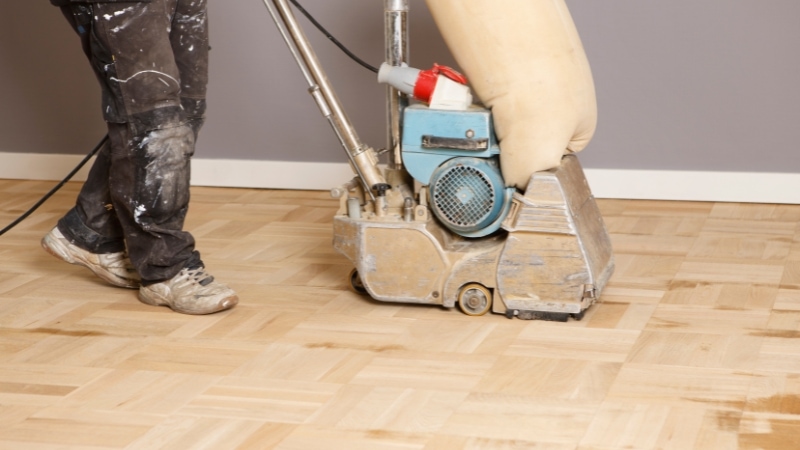
Tile
You must replace the cracked or chipped tiles individually to restore the floor’s appearance. Refinishing or sanding is not possible for tile flooring.
Which is Better? Tile vs engineered hardwood
Engineered hardwood stands out for its ability to be repaired and refinished multiple times during its lifespan, providing homeowners with long-lasting hardwood floors whose factory appearance is easy to maintain.
Factors to Consider When Choosing Between Engineered Hardwood and Tile
When deciding between engineered hardwood and tile flooring, it is important to consider several factors to ensure the best fit for your space and lifestyle. This section will explore these factors.
Aesthetic preferences
Aesthetic preference plays a significant role in the choice of flooring between engineered hardwood and tile. Engineered hardwood offers the warmth and timeless beauty of natural wood, imparting a classic and elegant touch to any room. On the other hand, tile flooring provides a wide range of design options, including various colors, patterns and textures, allowing for versatile customization to match different interior styles and preferences.
Lifestyle and household activities
When selecting flooring options, it is essential to consider your lifestyle and household activities. Engineered hardwood is ideal for areas with moderate foot traffic, providing warmth and comfort underfoot. In contrast, tile flooring suits areas exposed to water, such as bathrooms, kitchens and entryways.
Budget constraints
Engineered hardwood typically has a higher initial cost than tile flooring. However, it offers long-term value and durability, making it a worthwhile investment for homeowners seeking a lasting and elegant flooring option.
Making the Right Choice for Timeless Elegance and Durability
The decision between tile and engineered hardwood flooring depends on aesthetic preferences, lifestyle needs and budget constraints. Engineered hardwood offers timeless elegance and warmth, making it versatile for various indoor spaces. Its durability, ease of maintenance and refinishing ability contribute to its long-term value and appeal. On the other hand, tile flooring offers a wide range of design options. It is suitable for moisture-prone areas like bathrooms and kitchens. However, some homeowners may consider its maintenance requirements and limited repair options. Both options have advantages, and the choice ultimately depends on individual preferences and priorities.
At Villagio Wood Floors, we understand the importance of choosing the right custom hardwood flooring for your home. Our collection of engineered hardwood flooring offers beauty, durability and sustainability. With a wide range of style, finishes and the latest trending hardwood floor colors, you can create a space that reflects your unique taste and lifestyle. Explore our collection today and discover the perfect flooring solution for your home.
Tile vs Engineered Hardwood: FAQs
What are the disadvantages of tile?
While durable and versatile, tile flooring has some disadvantages. One drawback is its hardness, making standing on it for long periods uncomfortable especially for barefooted guests. Also, dropped items are more likely to break on tile surfaces. Grout lines between tiles can collect dirt and grime over time, requiring regular cleaning to maintain appearance.
Are there any health concerns associated with tile flooring?
Tile flooring is generally considered safe for indoor environments. However, some individuals may be sensitive to the chemicals used in tile manufacturing, such as volatile organic compounds (VOCs) emitted from adhesives and sealants. Proper ventilation during installation and curing can help minimize exposure to these chemicals.
Which type of flooring is more suitable for high-traffic areas like the kitchen?
We recommend tile flooring for high-traffic areas like the kitchen due to its ability to withstand moisture, stains and heavy foot traffic. Tile flooring is ideal for busy areas prone to spills and messes due to its durability and resistance.
Are there any eco-friendly options available in both engineered hardwood and tile flooring?
Yes! Eco-friendly options are available in engineered hardwood and tile flooring. Engineered hardwood can be sourced from sustainably managed forests and may incorporate recycled materials in its construction. Similarly, manufacturers produce tile flooring from eco-friendly materials such as recycled glass or porcelain.

